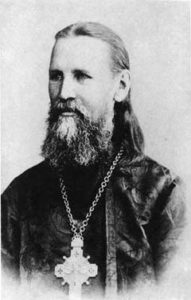SSCORRE!
Saint Sophia Cathedral
Online Resources for our Religious Edification

Topic of the Week –
The Secret of Happiness
“…I do not experience misfortune because misfortune happens when a person seeks his own desires…. I always strive to conform my will to the will of God, and by doing so, I count myself always happy…. more than anything I take care for this, that I would be in union with God and accord with His will.”
Excerpted from Instructions on Virtue, by Saint Dimitry of Rostov
Adult/Family:
“…those who don’t thank God deceive themselves all the time. Such people are deceived by their own thoughts. In most cases everything is fine with them and the Lord has blessed them abundantly, except for some specific thing that they consider to be a serious problem. And they may think about this “defect” for thirty years running, making themselves unhappy. For example, some think they have bad parents: “I wish I was born into a different family; then I would be happy.” Others assert that all their misfortunes were caused by their ginger hair, something they were bullied for in school. Others complain that they didn’t go to the best school and didn’t get a higher education. Their minds are clouded by such thoughts and they don’t even see the numerous blessings of God their lives are filled with. God endowed one person with many talents and everybody admires him, but a minor negative thought may make him unhappy! This is what St. Paisios the Hagiorite used to say about this:
Why do we allow ourselves to think nonsense and to be tempted by trifles, like, ‘Why did he say this to me? Why did he look at me that way? Why did he take a glass and go there and not here?’ And thousands of other childish things!
Thus thoughts can deceive us, blind us, and make our lives gloomy. In order to avoid this we should always control our hearts. As soon as we notice that something is going to upset us and the following thought is creeping into our mind: “I am unhappy because such-and-such has happened to me or I don’t have such-and-such a thing”, let’s be vigilant, knowing that trusting such thoughts is a terrible blunder. Thoughts of this kind may emerge in unexpected everyday situations or when someone bears a grudge or grief for a long time. Let’s make efforts, be watchful, let these thoughts go by without conversing with them; and let’s constantly feel gratitude to God in our hearts. Let us recall the wise words of Elder Paisios once again:
Whatever happens to us, let it be a reason for gratitude and not something to dwell on.
The secret of happiness is in these few words. Happiness is not in possessing some external things or changing circumstances; it is in giving thanks for everything, and through this being at peace with God and feeling His love. As St. Silouan of Mt. Athos said:
I used to think that happiness is here on the earth, that I was healthy, handsome, wealthy and loved by others. This filled me with vainglory. But I have regarded all the happiness in the world as mist that is carried away by the wind since I came to know the Lord by the Holy Spirit. And the grace of the Holy Spirit gladdens and delights the soul, which contemplates the Lord deep in the spiritual realm.
Read the entire article We Have Something to Thank God for Every Minute!
Preschool/Elementary:
St. Nikolai (Velimirovic) wrote a very interesting parable of a nobleman who lived in a palace in comfort and prosperity. Though he had everything he could dream of, a deep melancholy took possession of him. So he decided to go on a journey to relax a little. He rode on horseback for a long time but didn’t see anything interesting. At length he reached a field with a plowman and two oxen on it. And an unusual sight met his eyes. Now I will read you the rest of the story:
The nobleman saw one ox lying on the ground, the other ox standing yoked, and the plowman kneeling in the furrow, with his arms spread up to heaven, exclaiming over and over again: ‘Glory to Thee, O Lord! I thank Thee!’ Bewildered, the noble dismounted from the horse, came up to the plowman and asked,
“What are you giving thanks to God for so fervently?”
“One of my oxen has died,” the plowman responded.
“And you are praising God for this?” the rich man asked, surprised.
“Yes, exactly for this.”
“I don’t understand it,” the noble continued. “Someone else would be weeping, moaning and complaining about the injustice of heaven and earth, while you are giving thanks to God! Explain please, what for?”
The plowman sighed and said,
“I am a sinner, and that is why this misfortune has befallen me. The Lord has taken one of my oxen instead of punishing me with death. I cannot help but praise Him!”
The nobleman was even more surprised and asked him again,
“How are you going to plow with only one ox?”
“God will sort things out!” the plowman replied with a slight smile on his shining face.
And the nobleman realized that although he lived in a palace, he has not smiled as brightly as that poor peasant for years. He took several gold coins out of his pocket and offered them to him.
“Take them and buy another ox. Today I have learned a lot from you,” he said to the peasant.
The peasant exclaimed with joy,
“Didn’t I tell you, my lord, that God would sort things out?”
The peasant lifted his hands towards heaven and repeated loudly again,
“I thank Thee, O Lord! I thank Thee, O Lord!”
Though this could have been the end of the parable, it has a continuation. St. Nikolai related that after that encounter the nobleman rode back to his palace—only to find it in flames. What did the nobleman do? He knelt down, lifted up his arms towards heaven and exclaimed, “I thank Thee, O Lord! I thank Thee, O Lord!”
And he said to the servants who had been stunned by his behavior, “Calm down! I have not given thanks to God for so many years, though He has given me everything. Let me begin to do it now, when the Lord is taking everything away from me. It’s time for me to work—this is what I need to do in order to regain my purpose in life.” And the nobleman set about building a new house with his own hands. And, as St. Nikolai writes:
“The nobleman livened up, cleared his mind, and his spirits rose. And from that day on the rich man gave thanks to God for everything every day.”
This is how St. Nikolai concludes his parable. This story sounds like a fairy-tale, but it describes real things. Indeed, no one who thanked God was deceived. Thankfulness opens our eyes, so that we begin to see how God works in various life circumstances and pours out His love on us. It is natural for us to be grateful to the Lord continuously, for every human being has something to thank God for every minute.
Excerpted from We Have Something to Thank God for Every Minute!
Middle School/High School:
“Once a famous teacher prayed long and zealously to God, asking that He would show him some person from whom he could learn the true path to the Kingdom of Heaven. Thus one day, in front of the church doors, he met a poor, elderly man all covered with scabs and pus oozing wounds. For clothing he had nothing but rags. The teacher, passing by, greeted him accordingly and said, “Good day, elder!”
The elderly man replied, “I do not remember that any day has ever been bad for me.”
The teacher on hearing the answer stopped, and as if to recollect, said, “May the Lord give you happiness!”
The elder replied, “I’ve never been unhappy.”
The teacher was shocked and thought the elderly man did not hear him correctly, and so rephrased his greeting and said, “What’s this you’re saying elder? I wish to receive blessings.”
The elder said, “I’ve never received anything bad.”
The teacher said again, so as to test the elder, “May you receive whatever you desire.”
The elder replied, “I do not experience need in anything, because whatever happens to me I’m content with, and I do not seek passing fortunes.”
“May God save you for this! But tell me,” the teacher said, “surely you are not the only one among the poor not to undergo misfortune? I do not understand – how have you escaped evil circumstances?”
“Kind sir, it is as I replied to your first greeting. I have never known any misfortune or evil circumstance. Whatever situation God has given to me, for it I give thanks; in this is my blessing. I pay no regard to happiness and never pray about it to our Heavenly Father. I do not experience misfortune because misfortune happens when a person seeks his own desires. Even if I waste away because of hunger, yet even for this, I bless God as my Father, for He knows what I really need. If I suffer from frost, or am soaked to the bone from rain or any other such thing I may endure from the elements – for all this I also bless God. When people slander me, I praise God, knowing that He is working all this and it is impossible that He would work evil. And so, everything that comes from God – the pleasant or the unpleasant, the sweet or the bitter, I receive it all in the same manner, as from the hand of the Good Father. I desire but one thing, whatever God desires. In this way, everything that happens is according to my desire. I am sorry for those who seek happiness in this world, for true happiness in life is to reckon everything according to God’s will. The will of God is always perfect, good and true. I always strive to conform my will to the will of God, and by doing so, I count myself always happy.”
The teacher responded, “Tell me, I ask you, what would you think if God somehow sent you to hell?”
“How is it possible that He would? He knows that I firmly hold to Him with profound faith, and I love Him without hypocrisy. With these two bonds, I am so tightly bound to the Lord that wherever He would send me, there I would bring Him with me; it is more desirable for me to be with God outside of heaven than to be in heaven without God.
The teacher was amazed by the elder’s answer and thought, surely this is the straight way to God when people accord their will to His holy will. Wanting to test the wisdom of the poor elder one more time, he asked, “Where did you come from?”
“I came from God.”
“And where did you find God?”
“There, where I refused every material thing; in pure thoughts and a good conscience.”
“Who are you?”
“Who you see before you. I’m content with my situation and would not trade it for all the riches of earthly kingdoms. A true king is anyone who can rule himself and command his thoughts.”
“And where is your kingdom?”
The poor elder gestured with his hand to Heaven, “There is my kingdom.”
“Elder, who taught you all this, and who gave you this wisdom?”
“I will tell you, dear sir, I always abide in silence, whether praying or giving myself to devout thoughts; but more than anything I take care for this, that I would be in union with God and accord with His will.”
The teacher left the elder and went on his way, praising God, Who revealed the wisdom of the meek elder.
In this same manner as this humble elder, every Christian soul enduring tribulation must firmly know that nothing happens without the will of the Lord. Do not think that you are simply enduring things from evil people and circumstances; but rather you are experiencing that which the Lord has allowed. He reproves but those who patiently bear with thankfulness His reproofs, He kisses, comforts, and gives them His mercy. Embrace the good and perfect will of the Lord, for it shall arrange for you only good; trust God’s will and wait expectantly for His mercy. Say with the righteous Job, “The Lord gave, the Lord has taken away. As it seemed good to the Lord, so also it came to pass. Blessed be the name of the Lord” (Job 1:21), unto the ages of ages. Remember this: all of Job’s misfortune was allowed by the Lord’s will, and He transformed misfortune into great blessings.”
Excerpted from Instructions on Virtue, Chapter 3 – On Comfort in Affliction, pp28-30 by Saint Dimitry of Rostov
A Message from Maria Spanos
I am passionate about our Orthodox Christian faith and seek to help others learn as much as they can about it. My purpose here is to share online resources that help strengthen our relationship with Christ and bind us closer to His Church. I believe they are invaluable in learning about our precious Orthodox Tradition, and are a great aid for teaching family members, friends and others about Orthodoxy. ~Maria
Two of my favorite quotes:
 “A true Christian behaves in this life so that it may be a preparation for the future one and not only a life here below. In his actions, he does not think what will be said of him here but of what will be said there in heaven; he represents to himself that he is always in the presence of God, of the angels and all the saints, and remembers that someday they will bear witness of his thoughts, words, and deeds.” — Saint John of Kronstadt
“A true Christian behaves in this life so that it may be a preparation for the future one and not only a life here below. In his actions, he does not think what will be said of him here but of what will be said there in heaven; he represents to himself that he is always in the presence of God, of the angels and all the saints, and remembers that someday they will bear witness of his thoughts, words, and deeds.” — Saint John of Kronstadt
__________________________________________________________

“Of all the holy works, the education of children is the most holy.”
— St. Theophan the Recluse






